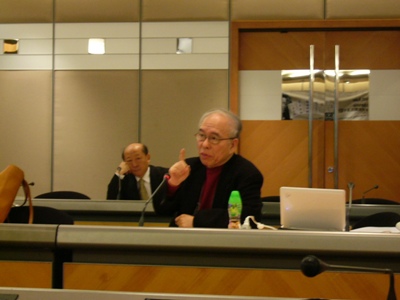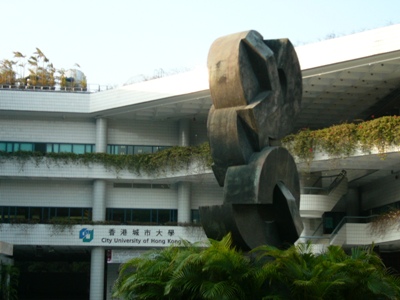【報告】Symposium on Zhang Taiyan in Hong Kong
Zhang Taiyan (Binglin, 章太炎 or 章炳麟, 1869-1936) was a distinguished scholar in modern Chinese history, and one of the most famous national revolutionaries against Qing dynasty before Xinhai Revolution in 1911. However, his various and profound thoughts which combined Chinese traditional philology, pre-Qin thought, Buddhism, and modern knowledge from Western science and philosophy are more significant. A symposium held in City University of Hong Kong (City HK) on December 21 and 22, 2010 (UTCP co-organized), intensely discussed Zhang Taiyan as a part of a larger East Asian intellectual problematic.
City HK organizers invited a distinguished scholar, one of the most famous experts of Zhang Taiyan, Professor Wong Young-tsu (汪栄祖, National Central University, Taiwan) to make a keynote speech on cultural pluralism of Zhang’s thoughts. How to consider the relationship between Zhang’s cultural pluralism and universality is an important question when we think about the meaning of Zhang Taiyan in today’s global conditions. Moreover, the multi-cultural and multi-linguistic character of Hong Kong (of course, her history and culture of colonization still has influences among several parts of Hong Kong society) seems to be more meaningful in the context of the idea of cultural pluralism in Zhang’s thought, which Prof. Wang emphasized in his presentation.
City HK leaders valued this symposium as their first international academic conference held in standard Chinese, or so called Putonghua. Each of scholars from mainland China, Hong Kong, Taiwan, Canada and Japan all used Putonghua (partly using English) to discuss and communicate with each other.
This symposium entitled “Intellectual Thought and Scholarship in East Asia: Zhang Taiyan and Late Qing Chinese Scholarship” was composed of 7 sessions, and we widely discussed Zhang’s scholarship and its problematic. You can find the concrete program of the symposium at the official web site (http://zhangtaiyan.ctl.cityu.edu.hk/ZTY_index.html).
At the first session, Prof. Sakamoto Hiroko (坂元ひろ子, Hitotsubashi University, Japan) mentioned Zhang’s medical knowledge, and analyzed its relevance to his thoughts about embodiment and hygiene. Prof. Li Zhensheng (李振声, Fudan University, China) and Prof. Zhang Zhaojun (張昭軍, Beijing Normal University, China) in the second session gave presentations concerning literature and history. How should we understand Zhang’s concepts of literature and history? This is one of the most important topics on Zhang Taiyan’s thought, because they are directly connected with philosophical questions about Chinese écriture and the possibility of thinking about other discourses on it. I think it was a very good arrangement by the organizer that they put these two presentations into the same session (in fact, there was originally another presentation scheduled for this session, by Axel Schneider, Göttingen University, Germany. He could not come because of the heavy snow in Europe). At the final session on the first day, Prof. Jiang Mei (江湄, Capital Normal University, China) and Prof. Zhang Zhiqiang (張志強, Chinese Academy of Social Science, China) made their presentations about Zhang’s Qiwu (斉物) philosophy. Qiwu is a word from Zhuangzi (荘子), which might be translated as “the equalization of things”. Based on affirming pluralism and cultural diversity, Zhang Taiyan’s thought about equality as a new type of universality against modern imperialism. Prof. Jiang’s clear survey of Zhang’s thought was impressive to me. Another speaker Ms. Peng Chunling (彭春凌, Peking University, China) focused on Zhang Taiyan’s experience in Taiwan, which was occupied by Japan just a few years before his visit in 1899.
On the second day, Prof. Chen Jidong (陳継東, Musashino University, Japan) made a detailed analysis on Zhang’s commentary to Reikon-ron (On Anima, 霊魂論) published in Japanese. Reikon-ron is an essay written by Tsumaki Jikiryo (妻木直良, a Buddhist scholar in Japan). Prof. Chen’s work really very worthy not only because this text was neglected by former researchers on Zhang Taiyan but also it revealed some important aspects on Zhang’s Buddhist thought and Qiwu philosophy. In his presentation in this panel, Prof. Viren Murthy (University of Ottawa, Canada) also analyzed Zhang’s Qiwu philosophy and Buddhism thought. His presentation underscored the limitations of viewing Zhang’s thought as an expression of pluralism by contextualizing Zhang’s scholarship in relation to capitalist modernity. In the next session, I presented a paper comparing the philology of Zhang Taiyan and Liu Shipei (劉師培, 1884-1919). My purpose in comparing the two was to raise a question about the formative conditions of Zhang’s cultural pluralism and Qiwu egalitarianism. If we neglect to rethink this question, we will not understand the relationship between Zhang’s nationalism and cultural pluralism; thus it will also be impossible to put his thought on the universality in the proper context. I think it is also very important to search his philosophical aporia, in order to discover the possibilities in Zhang’s thought.
Besides above mentioned presentations, Prof. Sun Jiang (孫江, Shizuoka Cultural University, Japan) analyzed national discourse influenced by Lacouperie’s hypothesis that claimed ancient Chinese had come from Babylonia. Prof. Wut Tai Shing (屈大成, City HK) talked about the relationship between Mahayana Buddhism and Zhang Taiyan. Both Prof. Wang Yuhua (王玉華, Shaanxi Normal University, China) and Prof. Wang Xiaolin (王小林, City HK) discussed Zhang’s Confucianism, particularly in relation to Xunzi (荀子). Prof. Kwok Pang Fei (郭鵬飛, City HK) made philological reading in Zhang’s work on Chunqiu Zuo Zhuan (春秋左伝). Prof. Lin Shaoyang (林少陽, City HK) focused on the concept of kuang (狂), a concept with which Zhang Taiyan jokingly referred to himself, and also is highly connected to Lu Xun’s (魯迅) critical discourse e.g. Diary of a Madman (狂人日記), Prof. Chan Hok Yin (陳学然, City HK) mentioned the relationship between Japanese Orient studies in late Meiji period and Chinese scholarship.
All presentations and discussions were sophisticated and stimulating, I really enjoyed myself thoroughly throughout these two days. I would like to express my sincere gratitude to the City HK symposium organizers. Prof. Zhang Longxi (張隆渓), who is a chair professor of comparative literature and translation, gave a lot of spiritual support with his esteemed intellectual leadership. The symposium created a friendly atmosphere for all participants. The success of the conference really owes to the leadership of Prof. Zhang and hospitality of his younger colleagues like Lin Shaoyang, Wang Xiaolin, and Chan Hok Yin. I want to give my deep thanks for their friendship at the end of this brief report.








